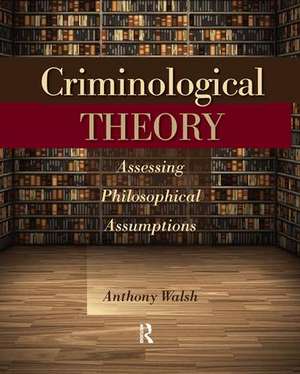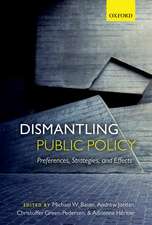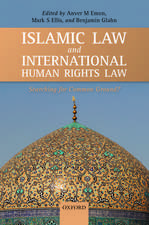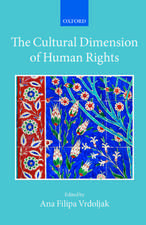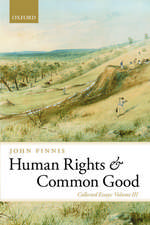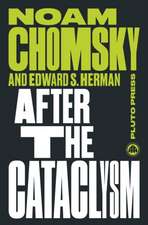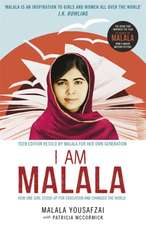Criminological Theory: Assessing Philosophical Assumptions
Autor Anthony Walshen Limba Engleză Hardback – 3 ian 2019
Toate formatele și edițiile
| Toate formatele și edițiile | Preț | Express |
|---|---|---|
| Paperback (1) | 567.45 lei 6-8 săpt. | |
| Taylor & Francis – 10 oct 2013 | 567.45 lei 6-8 săpt. | |
| Hardback (1) | 766.85 lei 6-8 săpt. | |
| Taylor & Francis – 3 ian 2019 | 766.85 lei 6-8 săpt. |
Preț: 766.85 lei
Preț vechi: 1028.98 lei
-25% Nou
Puncte Express: 1150
Preț estimativ în valută:
146.78€ • 159.49$ • 123.38£
146.78€ • 159.49$ • 123.38£
Carte tipărită la comandă
Livrare economică 21 aprilie-05 mai
Preluare comenzi: 021 569.72.76
Specificații
ISBN-13: 9781138371941
ISBN-10: 1138371947
Pagini: 238
Dimensiuni: 235 x 191 mm
Greutate: 0.6 kg
Ediția:1
Editura: Taylor & Francis
Colecția Routledge
Locul publicării:Oxford, United Kingdom
ISBN-10: 1138371947
Pagini: 238
Dimensiuni: 235 x 191 mm
Greutate: 0.6 kg
Ediția:1
Editura: Taylor & Francis
Colecția Routledge
Locul publicării:Oxford, United Kingdom
Cuprins
Chapter 1: The Usefulness of Philosophy in Criminology Chapter 2: Social Constructionism Versus Science in Criminology Chapter 3: Relativism, Rationalism, Empiricism, and Paradigm Shifts Chapter 4: Essentialism and Reductionism: Enemies or Friends? Chapter 5: What is Real and How Do We Know? Chapter 6: Materialism and Idealism: Structure versus Culture Chapter 7: Conflict and Cooperation; Alienation and Equality Chapter 8: Rationality and Emotion Chapter 9: Right and Wrong: Conscience Chapter 10: The Science Wars and Ideology in Criminology Chapter 11: Ideology and Causation Chapter 12: The Philosophy and Science of Human Nature Chapter 13: Feminist Criminology and Contending Metaphysics Chapter 14: Origins of the Intuition of Justice Chapter 15: Punishment: Justifications and its Role in the Evolution of Justice
Notă biografică
Anthony Walsh received his Ph.D. in criminology from Bowling Green State University in 1983. He worked as a marine, merchant seaman, police officer, and probation officer before entering academia at the age of 44. He teaches criminology, statistics, philosophy of law, and correctional assessment and case management at Boise State University. He is widely published, having authored or coauthored 33 books and more than 100 articles on criminology and biosocial aspects of crime.
Descriere
On reading Criminological Theory: Assessing Philosophical Assumptions students and scholars learn to clarify their own biases and better analyze the implications of a wide range of theories of crime and justice.
